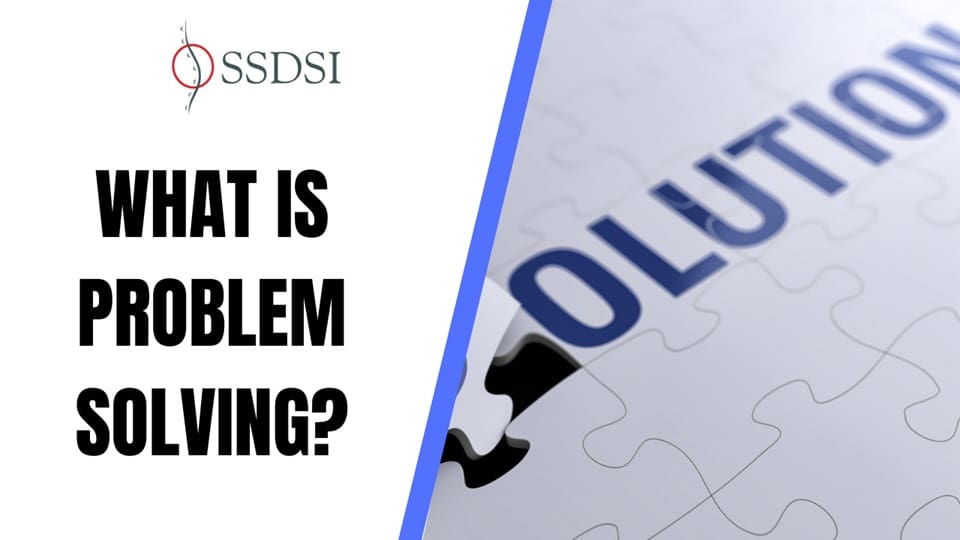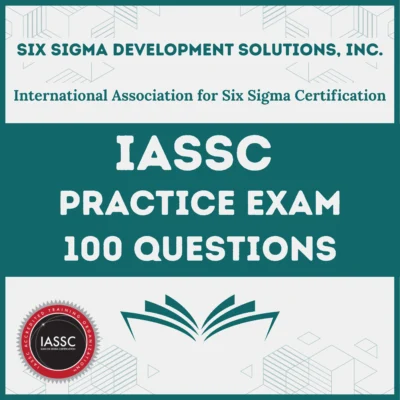Problem-solving is a multifaceted skill that involves identifying challenges, analyzing possible solutions, and implementing effective strategies.
By understanding the different types of problems, employing various strategies, and following a structured process, individuals and organizations can address issues more efficiently and effectively.
Developing a robust problem-solving approach not only enhances decision-making but also fosters adaptability, innovation, and continuous improvement. Whether in academic settings, professional environments, or everyday life, mastering problem-solving is essential for achieving success and overcoming obstacles.
Table of contents
What is a Problem?
A problem can be defined as an opportunity for improvement. Richard Bach aptly describes it: “Every problem has a gift for you in its hands.” The term “probortunity,” a blend of “problem” and “opportunity,” emphasizes this perspective. This mindset encourages viewing problems as potential opportunities for growth and improvement. An optimist, for example, perceives challenging situations as chances to find solutions and enhance their circumstances. Key questions for an optimist might include:
- Are there multiple opportunities embedded within this problem?
- Is this problem specific to me or is it an organizational issue?
- Is this issue a true opportunity or merely an annoyance?
- Is this the core problem or a symptom of a larger issue?
Defining Problems
- Gap Between Actual and Desired States: At its core, a problem represents a gap between the current state and a desired or ideal state. Recognizing this gap—whether in personal goals or organizational objectives—clarifies the nature of the problem and guides towards a more effective solution. A clear understanding of what one wants versus what one has enables better problem resolution.
- Imperfect Present and Better Future: Problems arise from recognizing the imperfections in the present and believing in the possibility of a better future. This belief fuels the motivation to address the issue and work towards improvements.
Characteristics of Difficult Problems
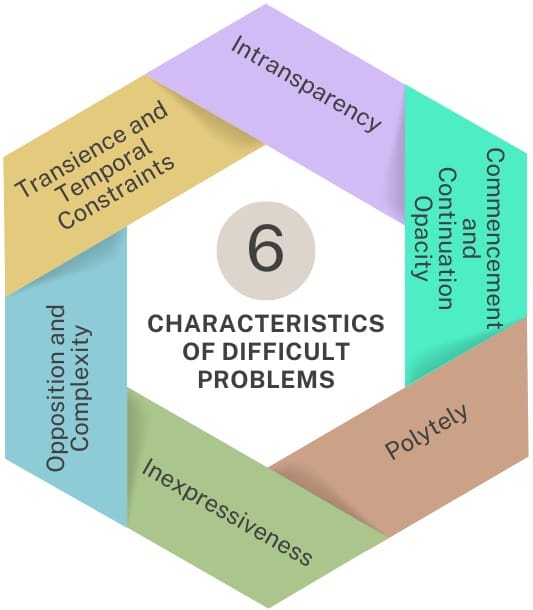
Difficult problems often exhibit:
- Intransparency: Lack of clarity in the situation.
- Commencement and Continuation Opacity: Confusion in starting and maintaining clarity on the problem.
- Polytely: Multiple goals complicating problem-solving.
- Inexpressiveness: Difficulty in articulating the problem.
- Opposition and Complexity: Conflicting elements and complex interrelationships.
- Transience and Temporal Constraints: Changing problems and time limitations.
Types of Problems
Problems can be classified in several ways:
- Based on the Type of Unknown:
- Known Problem, Known Solution: The problem and its solution are already established.
- Known Problem, Solution Requires Additional Expertise: The problem is known, but solving it requires specialized knowledge.
- Known Problem, Solution Requires New Approaches: The problem is recognized, but finding a solution requires innovative methods.
- Unidentified Problems: Problems that are not yet clearly defined or understood.
- Based on Level of Difficulty:
- Knowledge: Requires recalling facts or formulas.
- Comprehension: Involves understanding and interpreting information.
- Application: Applying knowledge to solve specific problems.
- Analysis: Organizing and examining information to identify patterns or relationships.
- Synthesis: Combining information to create new solutions or designs.
- Evaluation: Making judgments based on criteria and standards.
- Based on Open-Endedness:
- Open-Ended Problems: These problems do not have a single correct answer and may be subjective or opinion-based. They require divergent thinking and creativity.
- Close-Ended Problems: These problems have a definitive solution and are typically solved through convergent thinking and systematic analysis.
Perception of a Problem
Different people perceive and approach the same problem in distinct ways. For example, imagine someone is late for an important appointment and their vehicle breaks down.
They might handle the situation differently: some might focus on fixing the vehicle, others might call to reschedule the appointment, and some might seek alternative transportation or simply abandon the appointment. This variation in problem-solving approaches demonstrates that there is no one-size-fits-all solution.
To effectively train students in problem-solving, it’s crucial to recognize that there is no universal solution but rather a general approach that can be effective. This approach involves using a scientific method, which requires a scientific attitude. Understanding this is key to developing problem-solving skills.
Approaches to Problem Solving
Robert Harris outlines two primary approaches to problem-solving: Stop It and Mop It.
- Stop It: This approach aims to eliminate the problem at its source. It includes:
- Prevent It: This involves anticipating potential problems and taking proactive measures to prevent them from occurring. For instance, preventive health measures avoid the onset of illnesses.
- Eliminate It: This strategy involves removing the problem entirely. For example, repairing a leak in a tank addresses the root cause of the problem.
- Reduce It: When immediate elimination is not feasible, reducing the problem’s impact is an effective strategy. For instance, turning off the water supply to slow down a leak until it can be fully repaired.
- Mop It: This approach focuses on managing the effects of the problem rather than addressing its root cause:
- Treat It: This involves repairing the damage caused by the problem. For instance, cleaning up water from a leak and fixing the damaged floor.
- Tolerate It: Involves enduring the effects of the problem with minimal adjustment. For example, installing a drain to manage water leakage.
- Redirect It: Sometimes, the problem is redefined or downplayed. For example, treating a small leak as beneficial for adding humidity.
Nature
Prof. Jeff Malpas highlights that problem-solving is an ongoing activity. No problem is ever completely solved; solutions often lead to new challenges.
Successful problem-solving is part of continuous improvement and adjustment, recognizing that every solution may have unintended consequences. Effective problem management requires adaptability and acknowledgement of these evolving challenges.
Curiosity as a Driver of Problem Solving
Leonardo da Vinci’s approach to problem-solving exemplifies the power of curiosity. By constantly asking “Why?” and “Why not?”, one can discover new opportunities and insights. Curiosity drives creativity and innovation, encouraging a deeper exploration of problems and potential solutions.
Causes of Poor Problem-Solving
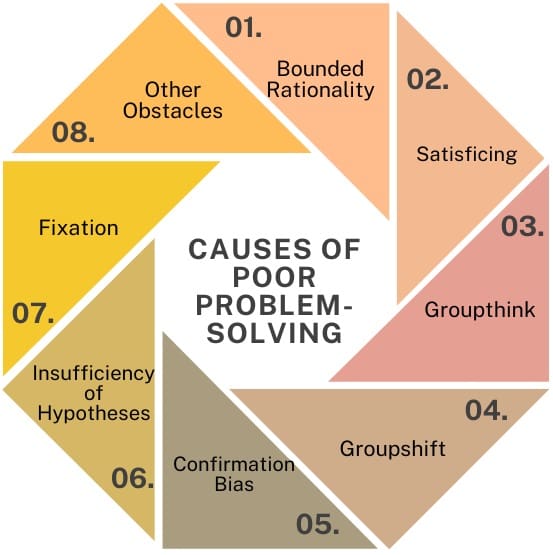
- Bounded Rationality: Herbert Simon’s concept of bounded rationality suggests that individuals make decisions based on simplified models of reality. Limitations of the human mind and the structures within which it operates constrain problem-solving abilities. For example, choosing a phone based on limited information can lead to suboptimal decisions.
- Satisficing: This involves selecting a solution that is “good enough” rather than optimal. This tendency can result in missing out on better alternatives due to a focus on familiar or less costly options.
- Groupthink: Irving Janis’s concept of groupthink occurs when group consensus overrides a realistic appraisal of alternatives. Symptoms include:
- Illusion of Invulnerability: Overconfidence and risky decisions.
- Collective Rationalization: Ignoring warnings against the group’s decisions.
- Illusion of Morality: Belief in the moral correctness of the group’s decisions.
- Excessive Stereotyping: Negative views of outsiders.
- Pressure for Conformity: Pressure on dissenters to conform.
- Self-Censorship: Withholding dissenting opinions.
- Illusion of Unanimity: Perception of unanimous agreement.
- Mindguards: Protecting the group from adverse information.
- Groupshift: This phenomenon occurs when group discussions lead to more extreme positions. Individuals may adopt riskier or more conservative stances based on group dynamics.
- Confirmation Bias: This bias involves seeking information that supports pre-existing beliefs while ignoring contradictory evidence. Effective problem-solving requires evaluating ideas objectively and considering alternative perspectives.
- Insufficiency of Hypotheses: Often, problem solvers settle for the first solution that comes to mind. This approach can limit effectiveness. Developing multiple hypotheses and allowing time for reflection can improve problem-solving.
- Fixation: Fixation refers to the inability to view a problem from a fresh perspective. Overcoming fixation involves stepping away from the problem to gain new insights.
- Other Obstacles: Overconfidence, misunderstanding information, and personal biases can also hinder problem-solving. Objectivity and thorough analysis of information are essential for sound decision-making.
Problem-Solving Process
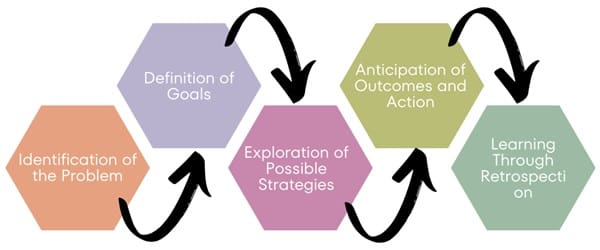
An effective problem-solving process often follows a structured cycle. The IDEAL model, developed by Bransford & Stein, provides a comprehensive framework:
- Identification of the Problem: Recognize and define the problem.
- Definition of Goals: Establish clear objectives for what needs to be achieved.
- Exploration of Possible Strategies: Investigate various approaches and methods to solve the problem.
- Anticipation of Outcomes and Action: Predict potential results and take appropriate actions.
- Learning Through Retrospection: Reflect on the process and outcomes to improve future problem-solving efforts.
Types of Problem-Solving Activities
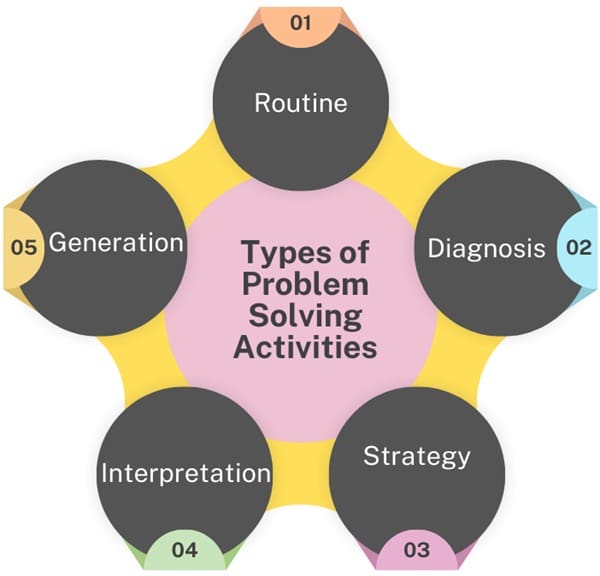
Problem-solving activities can be categorized into five types:
- Routine: Involves following a set series of actions with no need for decision-making. This approach is applicable when a problem can be addressed through established procedures.
- Diagnosis: Requires determining which routine or approach is most suitable for the problem at hand. This involves examining the problem to understand which existing methods or routines can be applied.
- Strategy: Involves finding the most effective routine or method to solve the problem. It requires evaluating different strategies and selecting the best one.
- Interpretation: Focuses on extracting and making sense of information from real-world situations. This step involves understanding and analyzing relevant data.
- Generation: Involves creating new routines or methods to address a problem. This step is crucial when existing solutions are inadequate or unavailable.
Problem-Solving Strategies
Effective problem-solving often relies on specific strategies. These strategies are methods or steps used to achieve goals and solve problems:
- Polya’s 4-Step Method: Proposed by Hungarian mathematician George Polya, this method includes:
- Understand the Problem: Clarify the problem and gather the necessary information.
- Devise a Plan: Choose the best strategy to tackle the problem.
- Execute the Plan: Implement the chosen strategy and check the results.
- Look Back: Review the solution and process to ensure accuracy and consider alternative methods.
- Common Strategies:
- Abstraction: Simplifying complex problems by focusing on the essential elements.
- Analogy: Using similar problems or solutions as a reference.
- Brainstorming: Generating multiple ideas or solutions through creative thinking.
- Divide and Conquer: Breaking a problem into smaller, more manageable parts.
- Hypothesis Testing: Formulating and testing potential solutions based on hypotheses.
- Lateral Thinking: Approaching problems from unconventional angles.
- Means-Ends Analysis: Identifying the means to achieve desired ends.
- Method of Focal Objects: Focusing on key elements or constraints to guide problem-solving.
Developing an Integrated Approach
An integrated approach to problem-solving involves more than just applying strategies. It requires:
- Building Skills and Capacity: Developing problem-solving skills and enhancing capacity to tackle various challenges.
- Encouraging Perseverance: Cultivating resilience and persistence in the face of difficulties.
- Reflecting on Thinking: Regularly reflecting on the problem-solving process to identify strengths and areas for improvement.
- Recognizing Multiple Solutions: Understanding that there may be various ways to solve a problem and being open to different approaches.
Why Problem-Solving Matters?
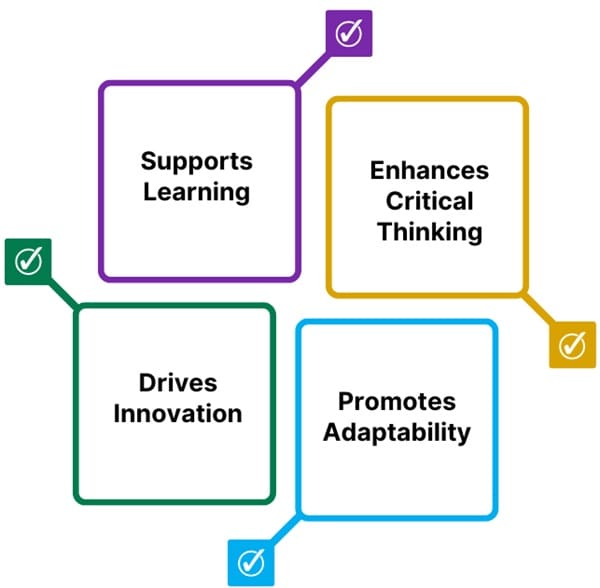
Problem-solving is crucial for several reasons:
- Enhances Critical Thinking: It encourages analytical and critical thinking, which are essential for making informed decisions.
- Promotes Adaptability: Developing problem-solving skills helps individuals and organizations adapt to changing conditions and challenges.
- Drives Innovation: Effective problem-solving often leads to innovative solutions and improvements.
- Supports Learning: It reinforces learning by applying theoretical knowledge to practical situations.
Domains of Problem Solving
- Psychology and Cognitive Science: In psychology and cognitive science, problem-solving focuses on the ability to transition from a current state to a desired state. This process involves various fundamental skills, including critical thinking, reasoning, and decision-making. Researchers in these fields explore how individuals think, learn, and apply cognitive strategies to solve problems.
- Computer Science: In computer science, problem-solving involves replicating human cognitive strategies through algorithms. This domain emphasizes creating computational models that mimic the problem-solving processes of the human brain. The goal is to develop software and systems that can tackle complex problems efficiently.
- Engineering: Engineers use problem-solving to design and optimize products and processes. The focus here is on preventing or addressing actual or anticipated failures. Engineers apply systematic approaches to identify issues, develop solutions, and ensure that products and processes meet desired standards and functions.
Scientific Attitude for Problem-Solving
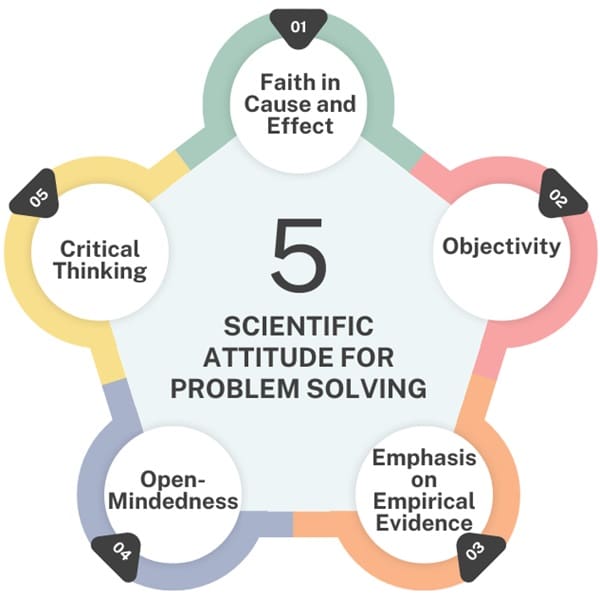
A scientific attitude is essential for adopting a scientific method of problem-solving. While the concept of scientific attitude is complex and involves many attributes, some key characteristics include:
- Faith in Cause and Effect: Understanding that outcomes are often the result of specific causes (e.g., low grades due to poor study habits).
- Objectivity: Being unbiased and focusing solely on the information, not influenced by sources or personal prejudices.
- Emphasis on Empirical Evidence: Relying on evidence rather than rumours or hearsay.
- Open-Mindedness: Being receptive to new ideas and willing to revise previous beliefs.
- Critical Thinking: Reflecting, analyzing, and synthesizing information to form rational conclusions.
Adopting a scientific attitude helps in analyzing problems, gathering relevant information, and seeking viable solutions. This approach is integral to developing effective problem-solving skills.
Developing Scientific Attitude
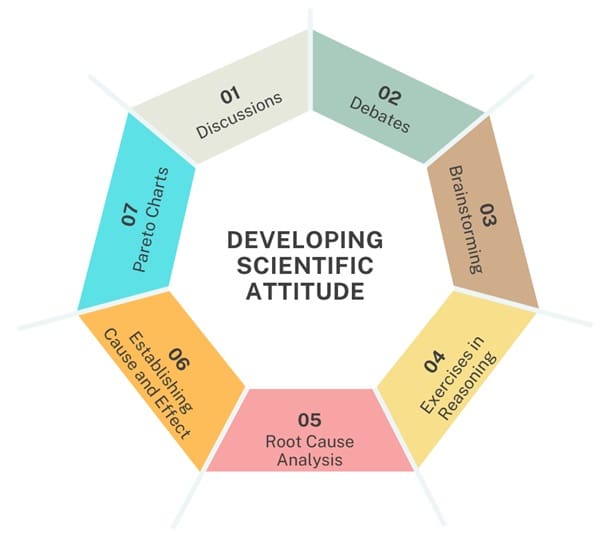
To cultivate a scientific attitude in students, consider the following strategies:
- Discussions: Facilitate discussions where students share real-life experiences related to problem-solving.
- Debates: Encourage debates to promote logical thinking, argumentation, and openness to diverse perspectives.
- Brainstorming: Use brainstorming sessions to generate creative solutions and encourage team participation.
- Exercises in Reasoning: Provide exercises that require inductive and deductive reasoning to enhance logical thinking.
- Root Cause Analysis: Use techniques like asking “why” repeatedly to uncover the fundamental cause of a problem.
- Establishing Cause and Effect: Create flow charts to visualize the relationship between problems and their causes.
- Pareto Charts: Use Pareto Charts to identify and prioritize factors contributing to a problem based on their frequency and impact.
Applying SWOT for Problem Solving
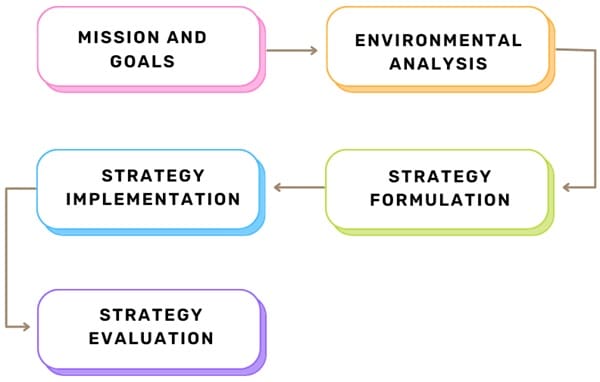
SWOT analysis, commonly used in business, can also aid in personal problem-solving. It involves:
- Mission and Goals: Define values and aspirations.
- Environmental Analysis: Assess internal strengths (S) and weaknesses (W), and external opportunities (O) and threats (T).
- Strategy Formulation: Evaluate interactions among these factors to make strategic decisions.
- Strategy Implementation: Execute the chosen strategy.
- Strategy Evaluation: Review the effectiveness of the strategy and adjust as needed.
For example, if a student is struggling with motivation, they could use SWOT to identify their strengths, weaknesses, opportunities, and threats related to their study habits and environment. This analysis can help them develop a strategy to improve motivation.
Decision-Making for Problem Solving
Effective problem-solving often involves decision-making. The process includes:
- Problem Identification: Clearly define the problem.
- Generation of Alternatives: Develop possible solutions.
- Evaluation and Selection of Alternatives: Assess each option and select the most viable solution.
- Implementation of the Chosen Solution: Apply the solution and monitor its effectiveness.
For example, if a student is struggling with study materials in a foreign language, they might consider switching to a different language medium or using additional resources like dictionaries. They would evaluate these options, choose the best one, and then implement it while monitoring its effectiveness.
Final Words
Effective problem-solving involves understanding the nature of the problem, employing appropriate strategies, and overcoming biases and limitations. By viewing problems as opportunities, embracing curiosity, and continuously adjusting to new challenges, individuals and organizations can navigate complex issues and achieve successful outcomes.

About Six Sigma Development Solutions, Inc.
Six Sigma Development Solutions, Inc. offers onsite, public, and virtual Lean Six Sigma certification training. We are an Accredited Training Organization by the IASSC (International Association of Six Sigma Certification). We offer Lean Six Sigma Green Belt, Black Belt, and Yellow Belt, as well as LEAN certifications.
Book a Call and Let us know how we can help meet your training needs.

